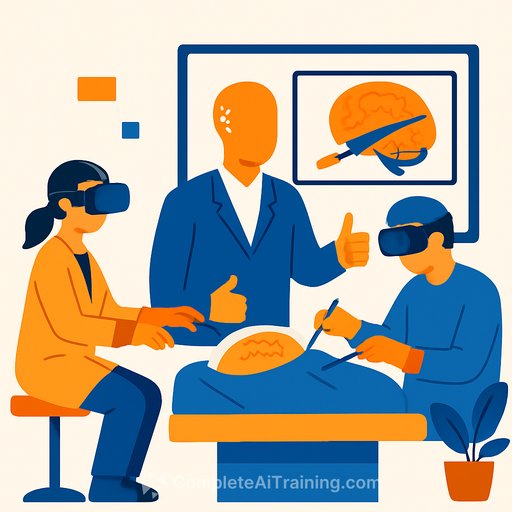A VR Simulator of Neurosurgery
Neurosurgical Simulation Performance
Artificial intelligence (AI) is increasingly integrated into medical training, including neurosurgery. A recent study published in JAMA Surgery highlights that AI tutoring yields better outcomes when combined with human instruction rather than used alone.
At the Neurosurgical Simulation and Artificial Intelligence Learning Centre at The Neuro (Montreal Neurological Institute-Hospital) of McGill University, researchers are exploring how virtual reality (VR) and AI can enhance brain surgeon training. They simulate surgeries in VR, use AI to monitor trainee performance, and provide ongoing verbal feedback to improve skills and reduce errors.
Earlier findings showed that the Centre’s AI-powered intelligent tutoring system outperformed expert human instructors—who did not have access to AI performance data. The current approach merges AI’s data-driven insights with experienced instructors’ guidance, moving closer to what is described as an “Intelligent Operating Room.”
Study Design and Results
The study involved 87 medical students from four Quebec medical schools, divided into three groups:
- One receiving only AI-generated verbal feedback
- One receiving feedback solely from expert instructors
- One receiving expert instructor feedback enhanced by real-time AI performance data
The researchers tracked how quickly and effectively students improved their surgical skills under each training method. The group receiving AI-augmented, personalized feedback from human instructors outperformed the others in both skill development and transferring those skills to new tasks.
They also showed better management of critical risks like bleeding and tissue injury, which are key indicators of surgical expertise.
Implications for Surgical Education
The findings suggest that while AI tutoring systems provide consistent, data-driven assessments, human input is essential to keep feedback relevant and responsive. Combining AI data with expert instruction enhances learner engagement and skill acquisition.
One lead researcher emphasized that expert instructors using real-time AI data can deliver feedback that helps trainees learn faster and apply their skills more effectively.
Although focused on neurosurgery, these insights could benefit training in other fields requiring technical skill development under pressure.
Future Directions
AI is not replacing surgical educators but empowering them. By integrating AI analytics with expert guidance, the goal is to develop operating rooms equipped to assess and train surgeons continuously, aiming to minimize errors during real procedures.
The study received support from several organizations, including the Brain Tumour Foundation of Canada, the Royal College of Physicians and Surgeons of Canada, Mitacs, and McGill University.
For healthcare professionals interested in AI applications in medical training, exploring courses on AI-driven education tools may offer practical insights. Visit Complete AI Training's healthcare courses for more information.
Your membership also unlocks:






